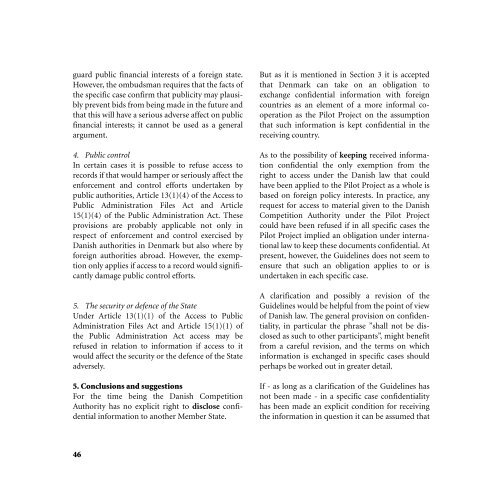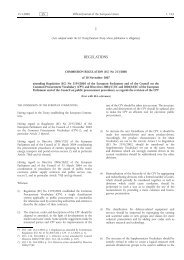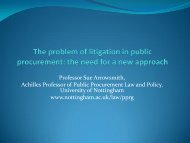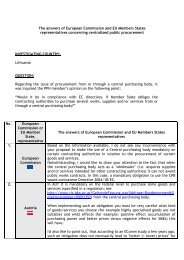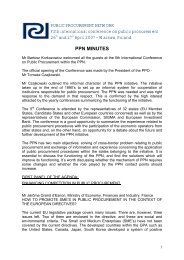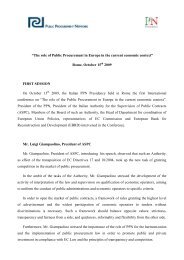Download the document (PDF file) - Public Procurement Network
Download the document (PDF file) - Public Procurement Network
Download the document (PDF file) - Public Procurement Network
Create successful ePaper yourself
Turn your PDF publications into a flip-book with our unique Google optimized e-Paper software.
guard public financial interests of a foreign state.<br />
However, <strong>the</strong> ombudsman requires that <strong>the</strong> facts of<br />
<strong>the</strong> specific case confirm that publicity may plausibly<br />
prevent bids from being made in <strong>the</strong> future and<br />
that this will have a serious adverse affect on public<br />
financial interests; it cannot be used as a general<br />
argument.<br />
4. <strong>Public</strong> control<br />
In certain cases it is possible to refuse access to<br />
records if that would hamper or seriously affect <strong>the</strong><br />
enforcement and control efforts undertaken by<br />
public authorities, Article 13(1)(4) of <strong>the</strong> Access to<br />
<strong>Public</strong> Administration Files Act and Article<br />
15(1)(4) of <strong>the</strong> <strong>Public</strong> Administration Act. These<br />
provisions are probably applicable not only in<br />
respect of enforcement and control exercised by<br />
Danish authorities in Denmark but also where by<br />
foreign authorities abroad. However, <strong>the</strong> exemption<br />
only applies if access to a record would significantly<br />
damage public control efforts.<br />
5. The security or defence of <strong>the</strong> State<br />
Under Article 13(1)(1) of <strong>the</strong> Access to <strong>Public</strong><br />
Administration Files Act and Article 15(1)(1) of<br />
<strong>the</strong> <strong>Public</strong> Administration Act access may be<br />
refused in relation to information if access to it<br />
would affect <strong>the</strong> security or <strong>the</strong> defence of <strong>the</strong> State<br />
adversely.<br />
5. Conclusions and suggestions<br />
For <strong>the</strong> time being <strong>the</strong> Danish Competition<br />
Authority has no explicit right to disclose confidential<br />
information to ano<strong>the</strong>r Member State.<br />
But as it is mentioned in Section 3 it is accepted<br />
that Denmark can take on an obligation to<br />
exchange confidential information with foreign<br />
countries as an element of a more informal cooperation<br />
as <strong>the</strong> Pilot Project on <strong>the</strong> assumption<br />
that such information is kept confidential in <strong>the</strong><br />
receiving country.<br />
As to <strong>the</strong> possibility of keeping received information<br />
confidential <strong>the</strong> only exemption from <strong>the</strong><br />
right to access under <strong>the</strong> Danish law that could<br />
have been applied to <strong>the</strong> Pilot Project as a whole is<br />
based on foreign policy interests. In practice, any<br />
request for access to material given to <strong>the</strong> Danish<br />
Competition Authority under <strong>the</strong> Pilot Project<br />
could have been refused if in all specific cases <strong>the</strong><br />
Pilot Project implied an obligation under international<br />
law to keep <strong>the</strong>se <strong>document</strong>s confidential. At<br />
present, however, <strong>the</strong> Guidelines does not seem to<br />
ensure that such an obligation applies to or is<br />
undertaken in each specific case.<br />
A clarification and possibly a revision of <strong>the</strong><br />
Guidelines would be helpful from <strong>the</strong> point of view<br />
of Danish law. The general provision on confidentiality,<br />
in particular <strong>the</strong> phrase ”shall not be disclosed<br />
as such to o<strong>the</strong>r participants”, might benefit<br />
from a careful revision, and <strong>the</strong> terms on which<br />
information is exchanged in specific cases should<br />
perhaps be worked out in greater detail.<br />
If - as long as a clarification of <strong>the</strong> Guidelines has<br />
not been made - in a specific case confidentiality<br />
has been made an explicit condition for receiving<br />
<strong>the</strong> information in question it can be assumed that<br />
46


